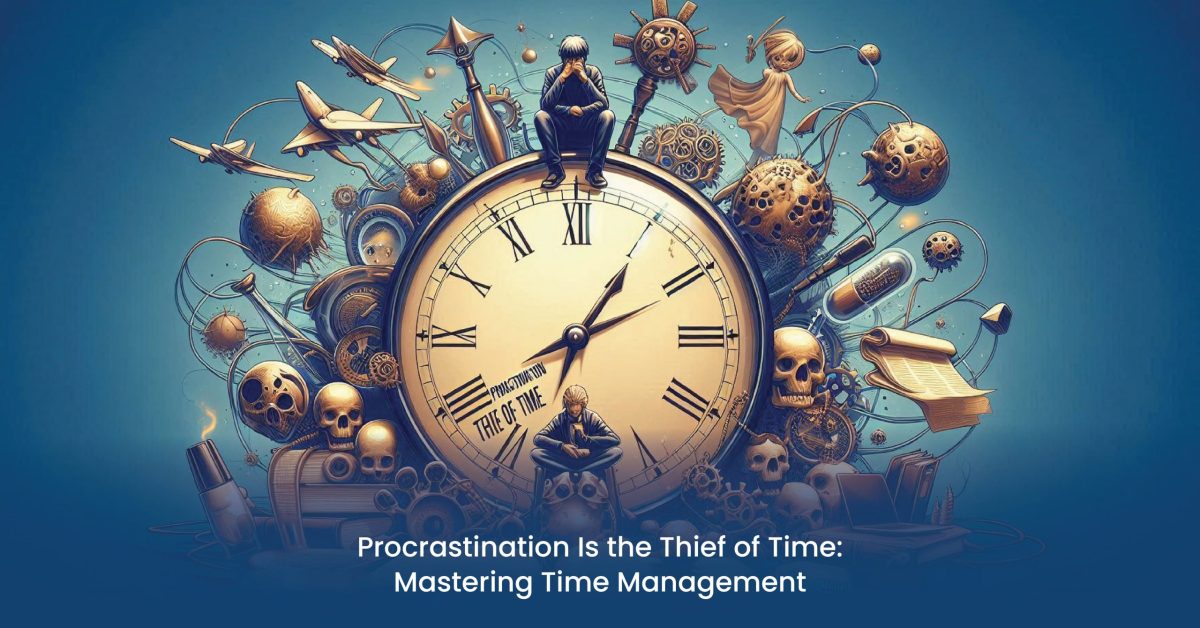Time management is more essential today than ever, considering we are living in a super-fast-moving world. Still, many of us get into this trap, often not being able to realize the great cost it extracts from our productivity and general well-being. “Procrastination is the thief of time” could not be more appropriate when it comes down to losing time by delaying certain tasks. Here, the article focuses on the ins and outs of procrastination, including an explanation of why people are its victims and how to practically master the art of time management.
The Nature of Procrastination
Procrastination refers to the act of delaying or putting something off that a person ought to be doing at that particular time. Mostly, procrastination involves replacing the original activity with a more pleasurable or less difficult activity. Occasional procrastination is natural and very normal; however, chronic procrastination can cause myriad problems, from missed deadlines to increased stress and low-quality work.
There are many reasons for procrastination. Some people are deathly afraid of failure, while others are overwhelmed by the task’s magnitude. Still, there is perfectionism, a fear of not being able to do something perfectly, coupled with anxiety that results in avoiding the task altogether.
The Cost of Procrastination
The effects of procrastination go a long way toward claiming more than just a loss of valuable time. It further results in increased stress and anxiety when the pressure to meet deadlines mounts. It can transmit to mental and physical health, including sleeplessness, headaches, and a weakened immune system.
Further, procrastination can have a domino effect in other areas of life. For instance, procrastination regarding work matters may mean the absence of decent performance appraisals, missed chances for promotion, and deteriorated working relationships. Now, in personal life, procrastination can result in missing appointments, neglecting personal relationships, and unmet long-term goals.
How to Overcome Procrastination
Beating procrastination and mastering time management are fundamentally conscious efforts. Following are some practical ways of getting control over time and thereby increasing productivity:
Set goals and priorities: Procrastination, at its very core, comes from a lack of clarity in one’s goals. Define what you want to achieve, and then break this down into smaller tasks. Now, label those tasks according to the level of their importance and urgency. This would, in effect, set up a roadmap toward your achievement and, hence, help you to focus and stay motivated.
Create a schedule: Go ahead and schedule your day or week based on when each task would be best done. You can use calendars, planners, or apps to help you accomplish this. Be realistic about the time it takes for every particular task, and remember not to overload your schedule. Make sure to fit in breaks so that you can recharge and avoid burnout.
Apply the Pomodoro Technique: This is yet another time management method whereby a certain period (usually 25 minutes) is spent on an activity and then followed by a short, five-minute break. After four cycles, you take a longer break of 15–30 minutes. With work broken down into these intervals by the Pomodoro technique, one will maintain focus without falling victim to burnout.
Avoid Distractions: Know what distracts you, and eliminate it. It could mean turning off notifications, working in a quiet space, or setting boundaries with coworkers or even family members. Sometimes it only takes having an appropriate place to work to make a world of difference in how much you accomplish.
Practice Self-Compassion: Whenever you slip up, be gentle with yourself. It is only human to procrastinate sometimes, and beating yourself up over it can just create a negative spiral. Rather, acknowledge the setback, learn from it, and refocus on your goals. Doing so will further the self-compassion that helps one to strengthen resilience and avoid future procrastination.
Set deadlines and accountability: Setting deadlines can create urgency and so help someone keep on track to achieve the task with timely completion. If self-imposed deadlines are not sufficient enough, be sure to share the goal with a friend, family member, or colleague, and then have them hold you accountable. Sometimes, knowing somebody else is aware of commitments already committed is enough to hold you true to your word.
Visualize the Rewards: Sometimes, getting the work started is all that is needed to visualize the good things that will come out as a result of completing the task. It could be that satisfaction when an item on your to-do list is ticked off, the praise for a job well done, or just the free time that you are going to gain. It is focusing on those rewards that will help overcome the inertia of procrastination.
Reflect and Adjust: Get back to your progress regularly and make adjustments accordingly. It’ll help a lot to reflect on what works and what doesn’t, thus making your approach more streamlined. Keep counting on your accomplishments in terms of confidence and motivation.
Conclusion
Procrastination indeed is a thief of time; however, with the right strategies at hand, you can always get over it and master the art of Time Management. You’ll make better use of your time by employing just a few simple practices. First, make out your goals and schedule, and avoid things that distract you from the important work. Overcoming procrastination does take patience and perseverance. You will finally overcome, and persistence and application will allow you to get into the habit of effective time management, which will enable you to hit all the goals for a life of worth.
